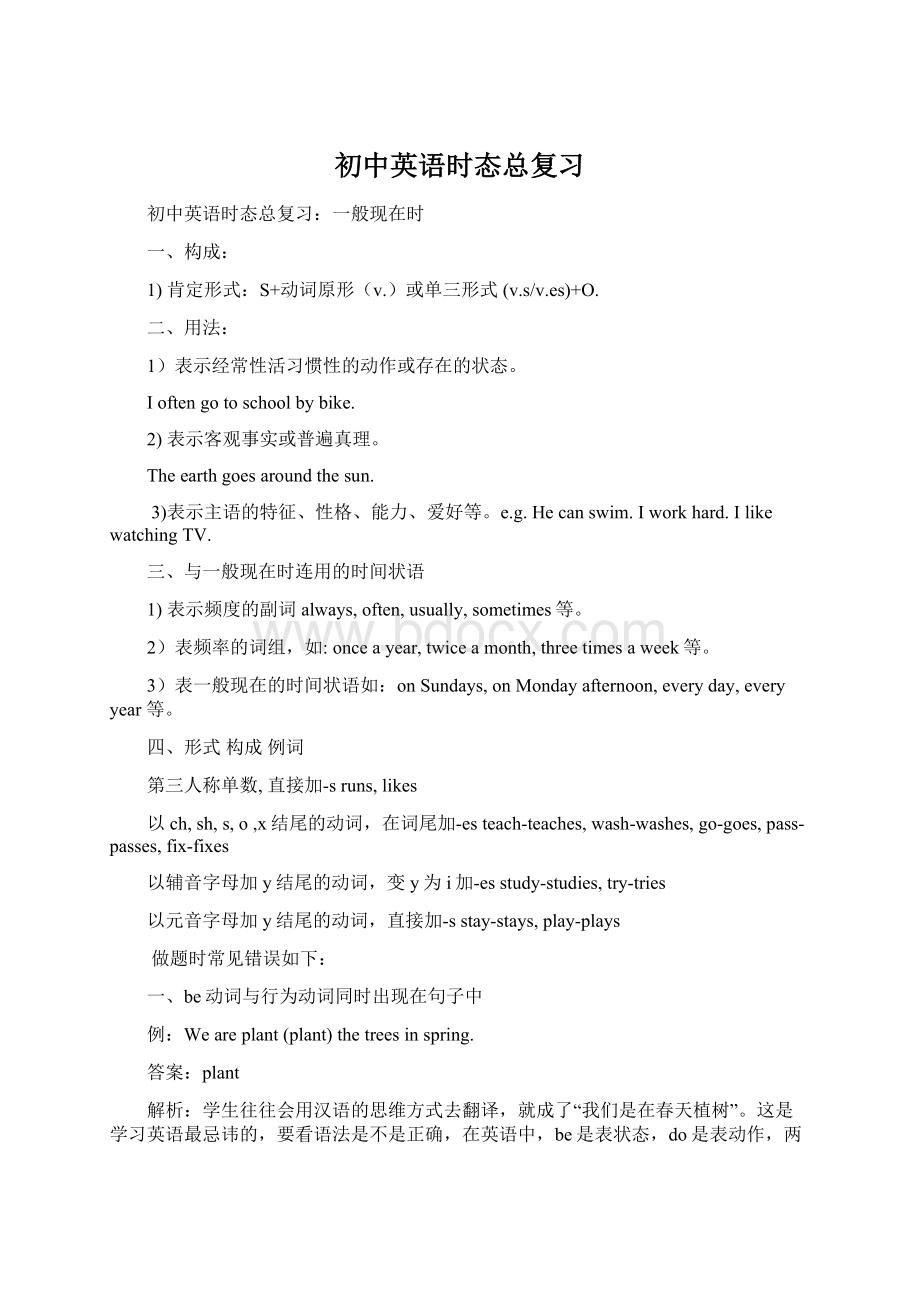初中英语时态总复习.docx
《初中英语时态总复习.docx》由会员分享,可在线阅读,更多相关《初中英语时态总复习.docx(8页珍藏版)》请在冰豆网上搜索。

初中英语时态总复习
初中英语时态总复习:
一般现在时
一、构成:
1)肯定形式:
S+动词原形(v.)或单三形式(v.s/v.es)+O.
二、用法:
1)表示经常性活习惯性的动作或存在的状态。
Ioftengotoschoolbybike.
2)表示客观事实或普遍真理。
Theearthgoesaroundthesun.
3)表示主语的特征、性格、能力、爱好等。
e.g.Hecanswim.Iworkhard.IlikewatchingTV.
三、与一般现在时连用的时间状语
1)表示频度的副词always,often,usually,sometimes等。
2)表频率的词组,如:
onceayear,twiceamonth,threetimesaweek等。
3)表一般现在的时间状语如:
onSundays,onMondayafternoon,everyday,everyyear等。
四、形式构成例词
第三人称单数,直接加-sruns,likes
以ch,sh,s,o,x结尾的动词,在词尾加-esteach-teaches,wash-washes,go-goes,pass-passes,fix-fixes
以辅音字母加y结尾的动词,变y为i加-esstudy-studies,try-tries
以元音字母加y结尾的动词,直接加-sstay-stays,play-plays
做题时常见错误如下:
一、be动词与行为动词同时出现在句子中
例:
Weareplant(plant)thetreesinspring.
答案:
plant
解析:
学生往往会用汉语的思维方式去翻译,就成了“我们是在春天植树”。
这是学习英语最忌讳的,要看语法是不是正确,在英语中,be是表状态,do是表动作,两种动词不能同时出现在句子中,可记住如下口诀:
“英汉语言有差异,be、do不能放一起,仔细琢磨细分析,语法千万要牢记。
”
专项练习:
一、单选
1Jenny____inanoffice.Herparents____inahospital.
AworkworksBworksworkCworkareworkingDisworkingwork
2Oneoftheboys_____ablackhat.
AhaveBthereisCthereareDhas
3Hesaidthesun____intheeastand____inthewest.
Arose;setBrises;setsCrises,setDrise;sets
4WangMei____musicandoften____tomusic.
Alike;listenBlikes;listensClike;arelisteningDliking;listen
5Jenny____Englisheveryevening.
AhasstudyBstudiesCstudyDstudied
二、填空
1_____yoursister_____(know)English?
2Thepot_____(notlook)likeyoursverymuch.
3Where_____you____(have)luncheveryday?
4Who_____(想要)togoswimming?
5______she_____(do)thehouseworkeveryday?
6JennyandDannyusually______(play)gamesintheafternoon.
3)写出下列动词的相应形式
1.第三人称单数:
wash_________match_______guess______study______finish_________go________snow______carry_________
2.写出下列动词的过去式:
stop_ped_____see__saw______drive___drove_____let___let____carry______keep_____join______find_______think________teach______catch______
3.写出下列动词的现在分词形式:
stay_______begin______forget_______forget______lie________die_______run_______prefer______give________ring_______dance______hope_______
4)改句子
1.Doyouoftenplayfootballafterschool?
(肯定回答)
2.Ihavemanybooks.(改为否定句)
3.GaoShan'ssisterlikesplayingtabletennis(改为否定句)
4.Davidhasgotagoal.(改为一般疑问句)
5.Wehavefourlessons.(否定句)
6.Nancydoesn'trunfast(肯定句)
初中英语时态总复习:
一般过去时
一、构成:
1)肯定形式:
S+动词过去式(v.+ed)+O.
二、用法:
1)表示过去某时间发生的动作或存在的状态。
Igotupatsixthismorning.
Wevisitedthefactorylastweek.
2)表示过去的习惯或经常发生的动作。
WhenIwasinthecountryside,Ioftenswamintheriver.
3)和一般过去式连用的时间状语
Lastnight,yesterday,lastweek,someyearsago,in1995,inthepast,theotherday,atthattime,justnow等。
三、形式构成例词
过去式与过去分词
(规则变化)直接加-edwork-worked
以e结尾的动词,直接加-dlive-lived
以辅音字母加y结尾的动词,
变y为i加-edcarry-carried,study-studied
以重读闭音节结尾且末尾只有一个辅音字母的,双写加-edstop-stopped,plan-planned
eg.---Howmuchmoneydidyou____onthedictionary?
---Seventy-nineyuan.
A.payB.spendC.costD.take答案(B)
Thedoctor____a____boyyesterday.
A.hadsaved;dyingB.saved;deadC.hassaved;deadD.saved;dying答案(D)
一、写出下列动词的过去式
is\am_________fly_______plant________are________drink_________
play_______go________make________does_________dance________
worry________ask_____taste_________eat__________draw________
put______throw________kick_________pass_______do________
二、用be动词的适当形式填空
1.I______anEnglishteachernow.
2.She_______happyyesterday.
3.They_______gladtoseeeachotherlastmonth.
4.HelenandNancy________goodfriends.
5.Thelittledog_____twoyearsoldthisyear.
6.Look,there________lotsofgrapeshere.
7.There________asignonthechaironMonday.
8.Today_____thesecondofJune.Yesterday______thefirstofJune.It_____Children'sDay.Allthestudents______veryexcited.
三、句型变换
1Therewasacarinfrontofthehousejustnow.
否定句:
__________________________________________________________
一般疑问句:
__________________________________________________________
肯定回答:
__________________________________________________________
否定回答:
__________________________________________________________
2Theyplayedfootballintheplayground.
否定句:
__________________________________________________________
一般疑问句:
__________________________________________________________
肯定回答:
__________________________________________________________
否定回答:
__________________________________________________________
四、用所给动词的适当形式填空
1.I______(watch)acartoononSaturday.
2.Herfather_______(read)anewspaperlastnight.
3.We_________tozooyesterday,we_____tothepark.(go)
4.______you_______(visit)yourrelativeslastSpringFestival?
7.I____________(sweep)theflooryesterday,butmymother______.
8.What_________she_________(find)inthegardenlastmorning?
She_________(find)abeautifulbutterfly.
9.It_________(be)Ben'sbirthdaylastFriday
10.10.Weall_________(have)agoodtimelastnight.
11.He_______footballnow,butthey_______basketballjustnow.(play)
12.Jim'smother_________(plant)treesjustnow.
五、句型转换
1、Lucydidherhomeworkathome.
(改否定句)Lucy______________________herhomeworkathome.
2、Hefoundsomemeatinthefridge(冰箱).(变一般疑问句)
___________he_____________________meatinthefridge?
3、Shestayedthereforaweek.(对划线部分提问)
_______________________________she__________there?
4、Therewassomeorangeinthecup.(变一般疑问句)
_________there___________orangeinthecup?
分类复习
现在进行时态
1用法:
①现在正在进行或发生的动作
例:
IamreadinganEnglishbooknow.我现在正在读一本英语书。
②当前一段时期内的活动或现阶段正在进行的动作
例:
TheyarelivinginBeijingthesedays.他们这些天一直住在北京。
2与现在进行时连用的时间状语常见的有:
now/thesedays/或有look,listen等的提示/
4现在进行时的构成:
be+现在分词
5现在进行时的四个基本句型
肯定句HeiswatchingTVnow.否定句HeisnotwatchingTVnow.
一般疑问句IshewatchingTVnow?
两回答Yes,heis.No,heisn’t.
特殊疑问句Whatishedoingnow?
6动词现在分词的构成
①一般在动词尾加ing例:
play→playing
②以不发音字母e结尾的动词,去e加ing例:
make→making
③以重读闭音节结尾,末尾只有一个辅音字母,先双写这一辅音字母,再加ing例:
put→putting
④特殊的有be→beinglie→lyingtie→tyingdie→dying
babysit→babysittinghiccup→hiccupping
7有些动词的现在进行时表示将要发生,常见的有go\come\leave\fly\move\start\arrive\do
例:
Iamcoming.我马上就来(将会来)
HeisleavingWuhanforBeijing.他将离开武汉去北京(将离开)
WhatisJimdoingonvacation?
吉姆度假打算做什么?
(将做什么)
巩固练习:
用所给动词的适当形式填空
1.Where’sourteacher?
------He______________(watch)afootballmatchontheplayground(操场)now.
2.Don’tmakeanynoise.Jim_______________(sleep)
3.They_______________(be)intheroomnow.
4.Howcolditis!
It’s_______________(snow)heavily.
5.Listen!
PeterandBecky_______________(talk)abouttheweather.
6.Bequiet!
Myteacheris____________________(say)something.
7.It’s8o’clock.They_______________(have)anEnglishclass.
8.Hurryup!
Yourmother_______________(wait)foryoudownstairs.
9.Wherearethetwins?
------They’re_______________(play)footballatschool.
10.Mr.Jonescan’tcome.He_______________(have)ameeting.
11.Look!
SallyandJim________________________(swim)intheriver.
12.Look!
They___________________(run)alongthestreet.
13.We_____________(practise)hardthesedaysbecausewewillhaveabigmatchnextmonth.
14.___________________you___________________(study)English?
------Yes,Iam.
写出下列动词的现在分词
sing_____________work_____________hike_____________smell____________take_______________
run______________be______________put______________do_______________lie_______________
get____________listen______________study___________go______________die______________
swim____________fly______________say_______________stop_____________eat_______________
一般将来时态
1.一般将来时的用法:
将来某个时间发生的动作或存在的状态:
有两种表示方式:
①will+动词原形例:
Itwillraintomorrow.明天将下雨。
②begoingto+动词原形例:
Heisgoingtohaveameetingtomorrow.明天他将开会。
2.与一般将来时连用的时间状语常见的有:
tomorrow/thedayaftertomorrow/nextweek/soon/inthreedays三天后/intheyear2020/
3.四个基本句型的构成
will+动词原形
begoingto+动词原形
特别词will/shall
特别词am/is/are
肯定句
Hewillhaveapicnictomorrow.
Heisgoingtoplanttreestomorrow.
否定句
Hewillnothaveapicnictomorrow.
Heisnotgoingtoplanttreestomorrow.
一般疑问句
Willhehaveapicnictomorrow?
Yes,hewill.No,hewon’t.
Ishegoingtoplanttreestomorrow?
Yes,heis.No,heisn’t.
特殊疑问句
Whatwillhedotomorrow?
Whatishegoingtodotomorrow?
4.shall一般和第一人称用于疑问句
例:
Shallwegototheparkbybus?
(第一人称,疑问句,用shall)IwillgotoBeijingtomorrow.(第一人称,不是疑问句,用will)5.表示“将要”的第三种方式:
be+现在分词例:
Jimisbabysittinghissisterthisweekend.Jim这个周末要照看他的妹妹。
TomisleavingWuhanforBeijing.Tom将离开武汉去北京。
巩固练习:
用所给动词的适当形式填空
1.LiLeitellsmehe_________________(visit)theGreatWall(长城)thisweekend.
2.Mymother_________________(buy)meapairofnewtrouserstomorrow.
3.Shesaysshe_________________(leave)soon.
4.We_________________(go)skatingifitdoesn’trainnextSunday.
5.There_________________(be)anEnglisheveningnextweek.
6.Thinkover,andyou_________________(get)agoodidea.
7.___________Jim___________(have)apicnicnextMonday?
------No,he__________.
8.I_________________(miss想念)youafteryouleavehere.
9.Who_________________(teach)youEnglishnextyear
10.He____________(be)backinthreehours.
11.Lookattheseclouds.It____________(rain).